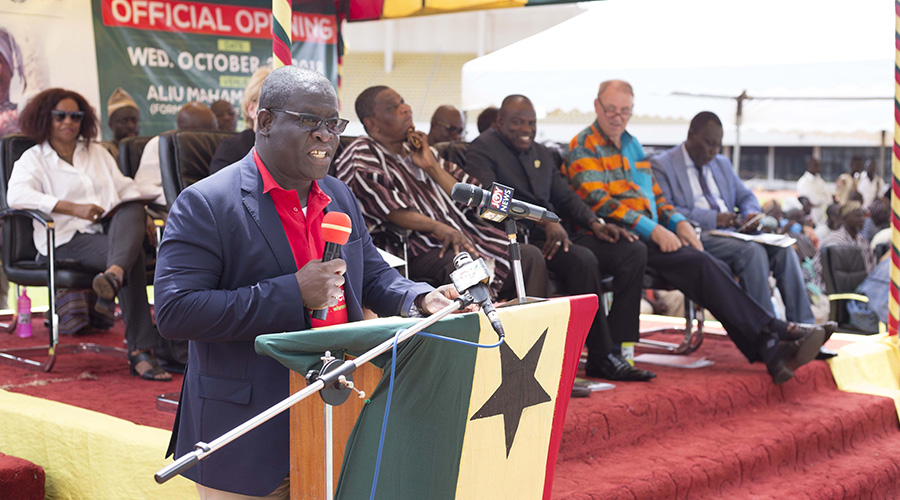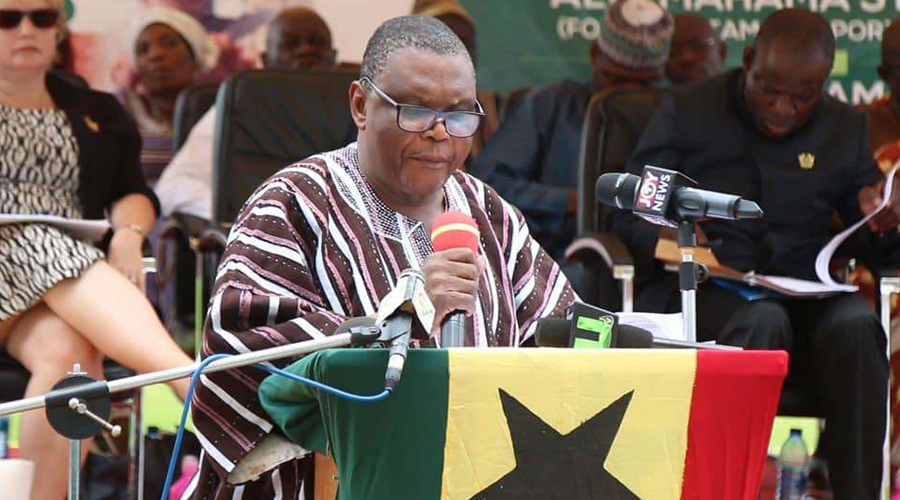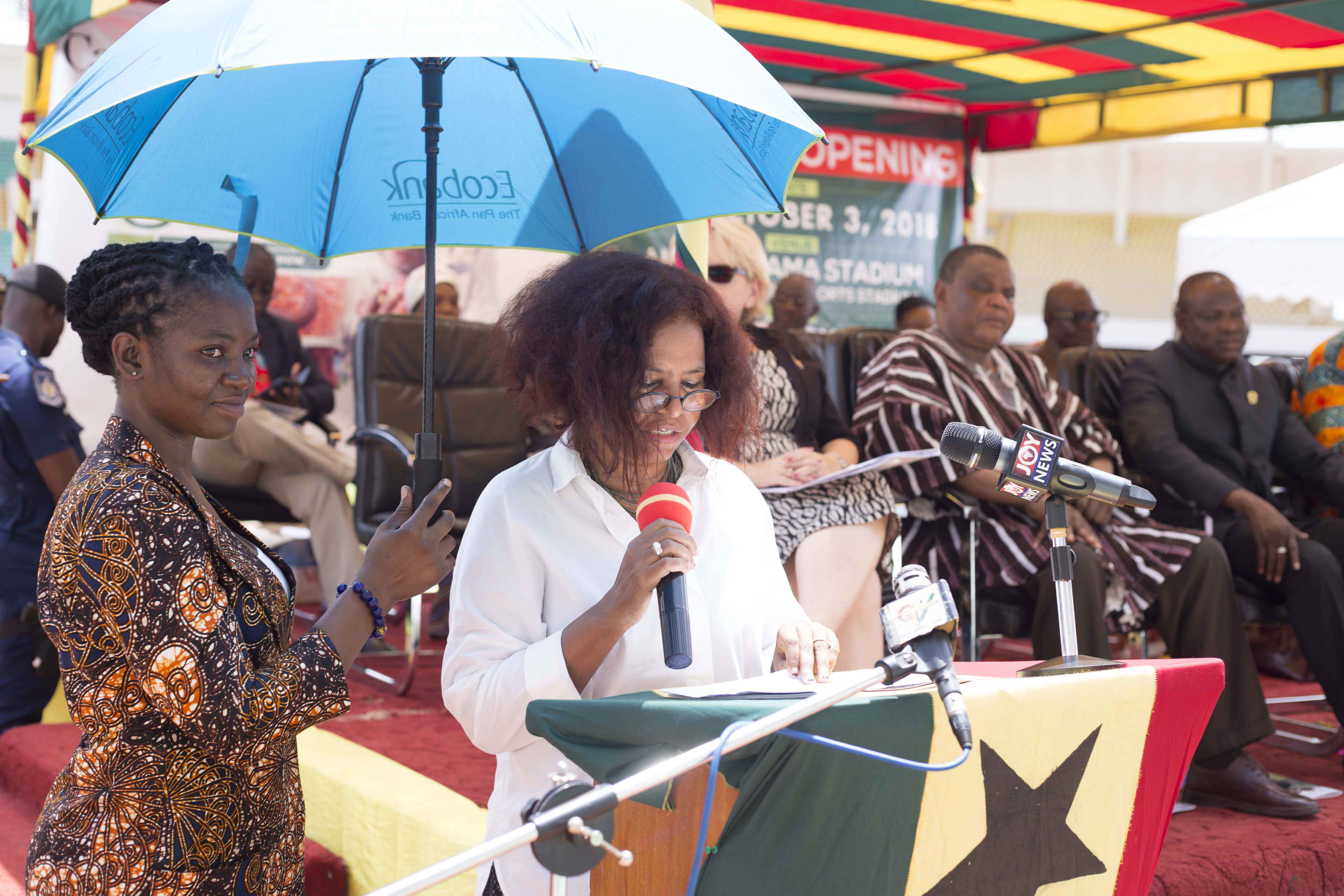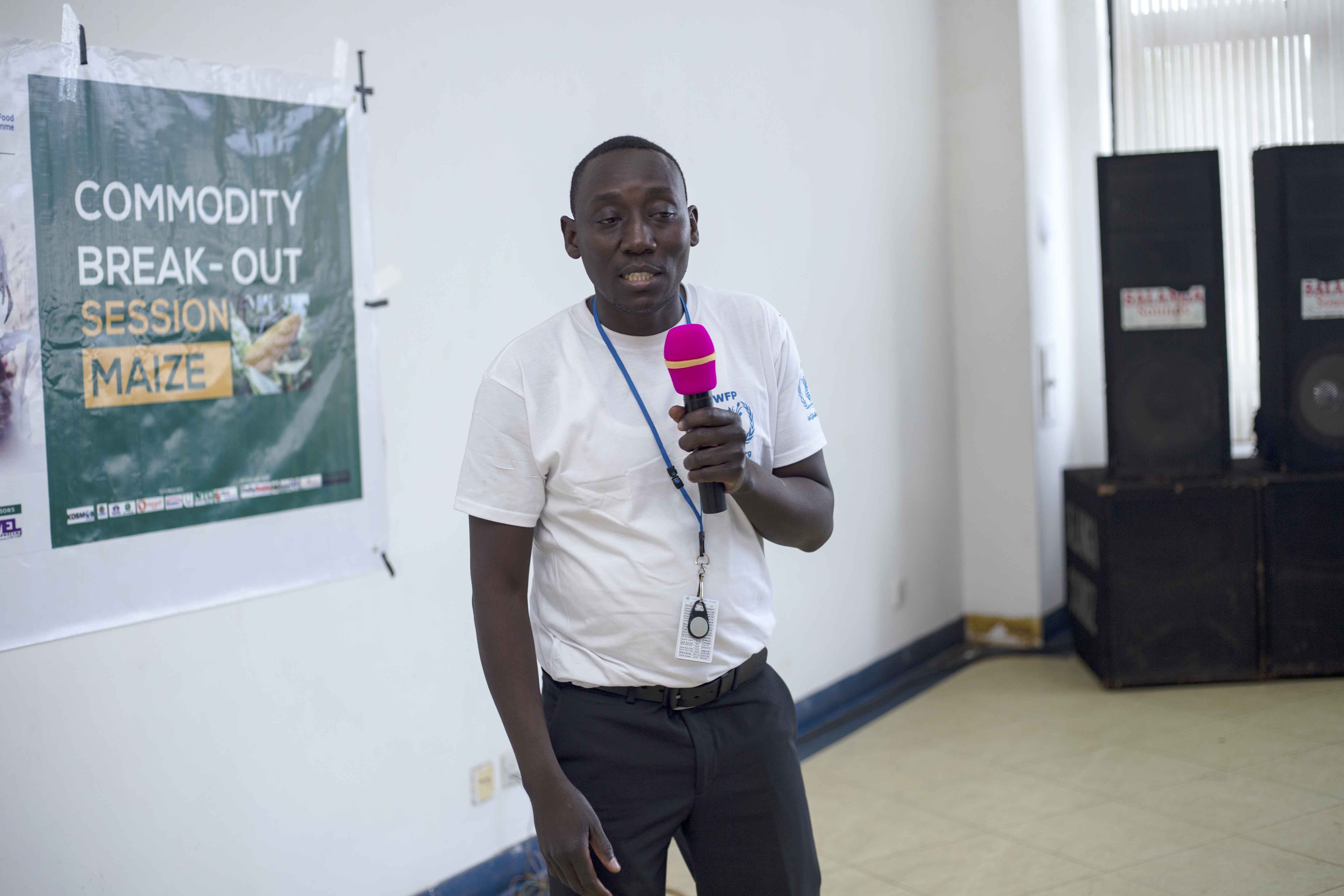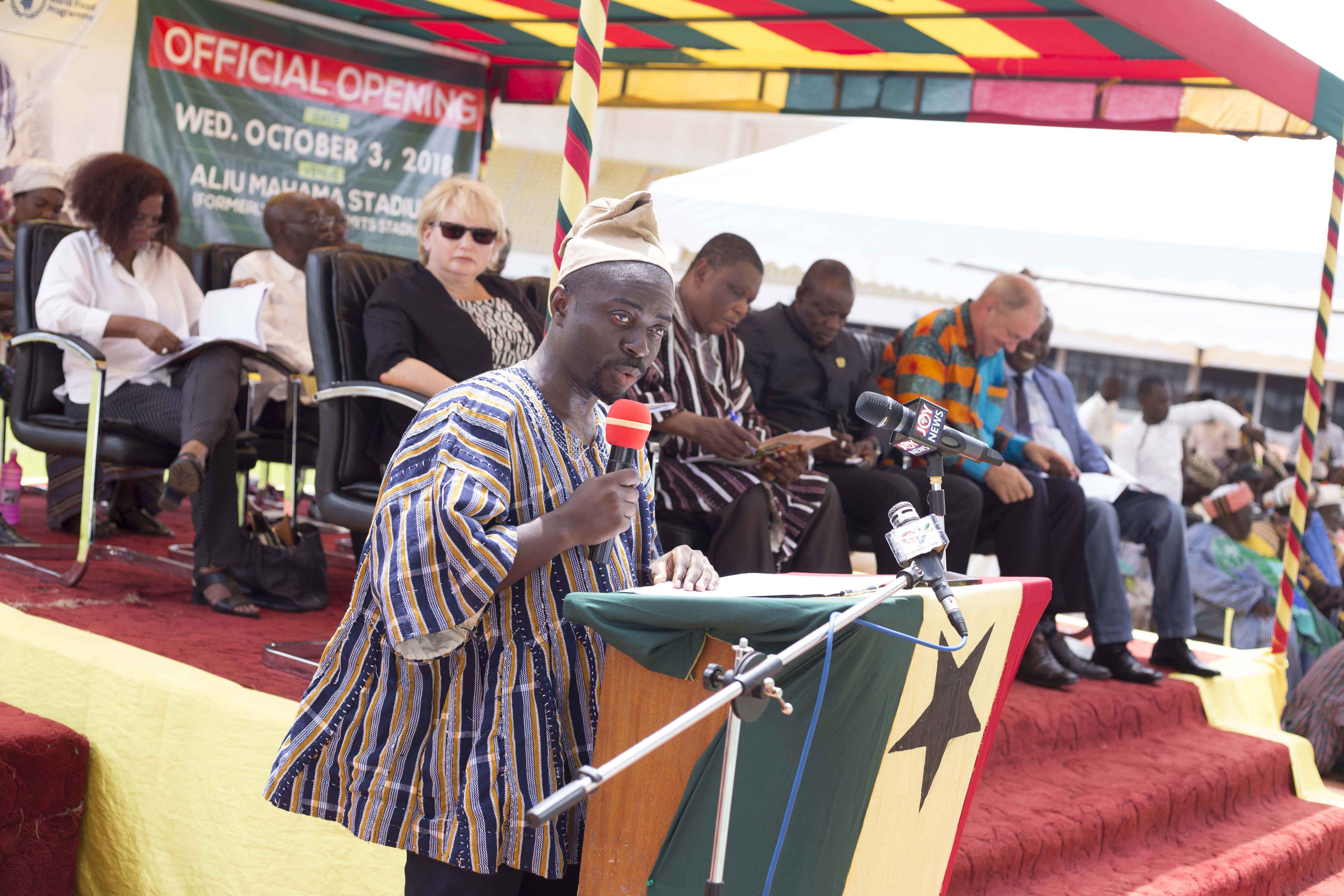Your Excellency, the Vice President,
Eminent Traditional Rulers, Regional Minister, Representatives from the Private Sector, Representatives of Development Partners, Representatives from NGOs, Distinguished guests, The media, Ladies and gentlemen
It is an honour and pleasure to be invited as a Special Guest Speaker to the 8th Pre-harvest Agribusiness Exhibition and Conference. I wish to start by commending Agrihouse and its partners particularly, the Feed the Future’s Agricultural Development and Value Chain Enhancement (ADVANCE) project of the United States Agency for International Development (USAID) for organizing this exhibition to promote business partnerships among value actors especially farmers, buyers, processors, transporters, input dealers, equipment dealers, government officials, financial institutions and telecom companies.
I also wish to underscore the significance of this year’s exhibition which you can see is bigger than we have always seen in its seven years of existence. It affirms and reflects the increased activities in the agricultural sector gingered by the flagship programmes the Government has put in place.
Mr. Chairman, the theme of our celebration “Transforming Agribusiness in Northern Ghana: The Future Starts Now” could not have been more apt. lt expresses two key words, transformation and urgency. In deed the future of thriving agribusinesses in northern Ghana to create jobs and turn around the fortunes of all actors starts now. The time is opportune. The sustainable Development Goals at the global level, the commitment at the continental level through the Comprehensive Africa
Agricultural Development Programme and the follow up Malabo declaration makes it compelling for countries to do more about their agricultural Sectors. It is evident that this agenda is being prosecuted by the President of the Republic of Ghana who has put in place many mutually reinforcing and integrated flagship programmes aimed at transforming the agricultural sector to bring about the needed jobs, particularly for the youth and improved livelihoods in the rural sector in particular.
Mr. Chairman, it is evident that agriculture holds the fortunes of Ghana’s economic transformation, job creation and sustained food security, as it employs close to 45% 0f the active population, majority of Whom are women (Gss,2014).
Therefore, transforming agribusinesses is strategically placed to drive Ghana’s economic development. Successive agricultural development strategies over the years have focused on modernizing the sector and positioning it as a major vehicle for the structural transformation of the economy through effective linkage to industry.
Agribusiness creates important linkages and encourages investment in a way that can have strong multiplier effects on growth. It is key to fighting food insecurity, not only because it stimulates increased production but also due to It’s potential to create wealth for smallholders and rural communities. Developing a viable and vibrant agri-business sector in Ghana is a development challenge, but it is also a significant market opportunity for companies and particularly smallholder farmers who are the largest private investors in agriculture.
Mr. Chairman, Agribusiness entails a shift to a demand driven agricultural development in which the entire value chain actors play critical roles. Agribusiness transformation involves value addition along the entire value chain, from providing inputs to farmers, to connecting them to consumers through general handling, processing, transporting, marketing and the distribution of agricultural products. Agriculture is no longer practiced just for subsistence or own needs but substantially for markets, profits and incomes. Agriculture has become a just for technology and market-oriented industry. Many People who work in agriculture actually do not work on the farms but engaged in businesses of seeds, fertilizer, agro chemicals, food processing, research, finance, marketing and trade.
Mr. Chairman, the broad disparities between northern and the southern Ghana in terms of economic development and well-being is still evident in the current statistics. It is therefore important that more is done to bridge the poverty divide to ensure growth with equity. The agribusiness sector holds the opportunities for this through private sector investment in off farm activities other than primary level.
Mr. Chairman, despite efforts to increase access to irrigated agriculture, the region’s agriculture remains strongly dependent on rainfed cultivation, making it highly vulnerable to climate change risks. Agricultural growth will thus have to rely on increasing both rainfed and irrigated production to provide the necessary raw material for processing and increased marketable surplus in the three northern regions to satisfy the increased economic activities expected in agribusinesses. Marketing improvement will require building food and commodity Chains to connect northern producers to markets in the South and even beyond the borders of Ghana.
In effect, a thriving agribusiness section in Northern Ghana will require significant improvements in the following:
- Commercial orientation of production to meet market demands,
- Policies that crowd in the private sector and promote strong public private partnerships (PPP) in areas of market failure
- Increasing infrastructure investments such as roads energy and water for processing
- Promoting consumption of food produced locally.
Mr. Chairman, it is in line with this, that the Government, under the leadership of His Excellency, Nana Addo Dankwa Akufo- Addo upon assumption of office in 2017, introduced the following flagship programmes:
- The Planting for Food and Jobs (PFJ) campaign to increase productivity and production for food security, raw material supply by industry and employment.
- The One Village, One Dam (IVID) programme to ensure‚ availability of adequate water for agricultural production all year round, especially in the northern regions
- The One District, One Factory programme aimed at transforming the structure of the economy from one dependent on production and export of raw materials, to a value-added industrialized economy, driven primarily by the private sector.
There are also, other interventions in mechanization, irrigation, livestock development and Access to finance by various actors in the agricultural value chain by the Ministry of Food and Agriculture.
The PFJ was reviewed in March this year after one year of implementation and the outcome was a resounding success.
- Over 200,000 beneficiary farmers (smallholders) of the campaign were supported with a total of 4,400 MT of improved seeds of maize, rice, soya bean, sorghum and Vegetables. These farmers also benefited from a total of 296,00MT of fertilizer (NPK, Ammonia and Urea) during the period.
- As a result, there were impressive increase in Production volumes of 485,000MT of maize, 179,000MT of rice, 33,400MT of sorghum, 9,750MT Of Soya bean and 42,200MT of selected vegetables under the Campaign in 2017.
- These harvests at the farm gate generated an average income of about 1.2 billion cedis to the beneficiary farmers which to a large extent enhanced their livelihood.
- An estimated 715,000 direct and indirect job opportunities were created at the farm level and another 30,000 jobs along the value chains of the commodities promoted.
- Registration of farmers to create a database is currently ongoing and 500,000 direct farmers are targeted in 2018 against 200,000 in 2017.
- The crops have also been extended to include cassava, groundnuts, cabbage and lettuce in 2018.
Under the One Village, One Dam, a total of 570 small dams are at various stages of construction in the three Northern regions (320 in the Northern region, 150 in the Upper East region and 110 in the Upper West region) to enhance access to water for agricultural production all year round.
A total of 15 factories (most of them agricultural based have been constructed and are currently operating in various areas across the country under the One District One Factory Initiative. An additional 50 are being accredited and would be commissioned by December, 2018. Another 100 factories are at various stages of assessment by various banks and will be included when finally approved
Incentives to support individuals interested in the IDIF are the following:
- A 5-year tax holiday will be extended
- All machinery and equipment will be imported duty free
- Additional raw materials will be imported duty free
- Enjoy exemption from withholding taxes
- lDlF Companies will enjoy subsidized interest rate (Borrow at 10% and Government will pay the difference)
Ladies and gentlemen, interventions by the Ministry in ensuring farmers have access to mechanization services include acquisition of tractors and small farm implements to augment the current Agricultural Mechanization Services Centres (AMSECS) already in the country. An amount of USD 150M Indian Exim bank facility has been sourced for machinery/ equipment to strengthen AMSECs across the country. Also, processes have been initiated in collaboration with the Brazilian government to set up a local factory to manufacture farm machinery and equipment suitable for small farms. The use of this equipment will reduce drudgery in land preparation and other activities along the value chain.
In the livestock subsector (pigs, sheep, goats and poultry) the Ministry will soon launch the Rearing for Food and Jobs Campaign. This will enable access to improved breeds of livestock, infrastructure development and improved. Rehabilitation of fodder banks across the country.
To enhance access to finance, the Ministry is implementing the Outgrower Value Chain Fund (OVCF) coupled with the Ghana Incentive Based Risk Sharing for Agricultural Lending GIRSAL) in conjunction with the Bank of Ghana. The aim of GIRSAL is to share the risks between agricultural stakeholders and therefore lower cost of credit to agriculture.
The Savannah Agricultural productivity improvement project (SAPIP ) which is being implemented by the Ministry in selected districts in the Northern regions is also aims at transforming agricultural value chains for food and nutrition security, job and wealth creation in the Northern Savannah Zone of Ghana. The project will increase farmers food and nutrition security and incomes through increased agricultural productivity and diversification; and enhance the creation and strengthening of agribusinesses to increase incomes of actors along selected value chains on a sustainable basis.
Mr. Chairman, Ladies and gentlemen, all these interventions are aimed at creating the enabling environment for the transformation of agribusinesses so as to provide employment to the unemployed youth and enhance income for the smallholder farmers. Just look around and take advantage of the numerous opportunities available. The Future indeed Starts now and all efforts are being made to address the identified constrains to the development of Agribusinesses across the country.
On this note Mr. Chairman, I wish to thank you all especially the various exhibitors who have travelled across the length and breadth of the country to participate in the Exhibition. I wish you a successful conference and exhibition
Thank you.
